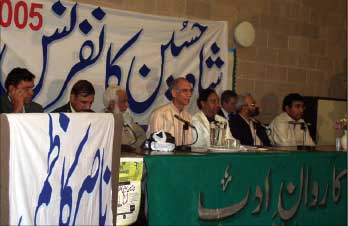|

Bringing Urdu, Punjabi
and English Poetry Together
By Iftikhar Nasim

Left
to right: Qayyum Tahir, Dr. Inam ul Haq Javaid, Dr.
Riaz Majeed, Dr. Amanullah Khan, Iftikhar Nasim, Khlid
Masood, and Sabir Raza
|
Karvan-e-Adab Manchester,
England, has its yearly conference in July-August and, this
year, it invited luminaries like Dr. Riaz Majeed, Murtaza
Birlas , Dr.Inam Ul haq Javid, Agha Nisar, Majid Yazdani,
Salim Akhtar , Iftikhar Nasim (Chicago), Khalid Masood Khan,
Qayyum Tahir and of course Dr. Amanullah Khan (Dallas) to
the annual congregation.
Karvan -e- Adab was celebrating the birth of the famous
Punjabi Sufi poet Shah Hussain aka Madhu Lal Hussain. Sabir
Raza, a famous poet and Punjabi novelist and president of
Karvan-e-Adab, started the convention’s proceedings.
He was very appreciative of Shah Hussain’s valuable
literary contribution and spotlighted his influence on the
Punjabi poetry.
Dr. Riaz Majid presented a paper on the technicalities and
difficulties of the Punjabi language of the past and the
present. Dr. Inam Ulhaq Javaid elaborated on his work on
Shah Hussain. He has recently printed a book on the subject
in Islamabad.
Presiding over the Conference, Dr. Amanullah Khan recited
his English poem - Let Us Sing Peace. In the poem he stresses
that peace among masses could be achieved if we follow the
Sufi path shown by Shah Hussain. He received a standing
ovation from the gathering. Iftikhar Nasim presented a paper
in English on Madhu Lal Hussain’s work. He talked
at length about his poetry and the inspiration he got from
Madhu Lal Hussain’s love for God and humanity.
A trilingual Mushaira followed in which local poets presented
their ghazals and nazams Dr Inam ul Huq Javed and Khalid
Masood Khan recited their light-hearted, humorous poetry
which had an enlivening influence on the proceedings. They
were followed by Iftikhar Nasim who read his ghazals. Dr.
Amanullah then read his poem about peace in English which
was very much appreciated and admired, especially by the
young audience born in England. It would not be wrong to
say that Dr. Khan is becoming an icon of Punjabi language,
both in England and the USA. His poetry has been translated
in Gurumukhi and he has a big following in East Punjab also.
Then there was Mr. Murtaza Birlas who had to recite his
poetry many times over at the request of the audience.
After the mushaira famous folk singer Reshma came to the
stage. Reshma is admired by all age groups. Hussain Bakhsh
Gullu, a famous classical and Sufi singer, electrified the
audience with his performance. He was an instant hit.
The next evening Dr. Amanullah and the rest of the poets
were invited by DM television and a Mushaira was recorded.
This Mushaira was telecast all week.
The Touchstone Center at Bradford University invited Iftikhar
Nasim to give a lecture on peace and the recent bombing
in London and his talk was followed by a small poetry session.
Dr. Amanullah Khan was invited by many organizations to
participate in poetry sessions arranged in London, New Castle,
Bradford, Birmingham, Oldham Nottingham and Glasgow.
Karvan-e-Adab has become an institution where not only the
seasoned poets and writers from India, Pakistan and Europe
are invited but where young and new writers also get respect
and acclaim. Sabir Raza is gaining popularity and recognition
in the Urdu and Punjabi literary circles. The recent conference
was a huge success. Dr. Amanullah Khan’s English poem
brought a unique touch and also furnished a better perspective
of a Muslim poet who believes in the finer values of humanity
regardless of race, color, or creed. There is a serious
talk going on to translate Dr. Khan’s Punjabi poetry
into English which will bring a new flavor in the genre
of Punjabi and English literature.
Karvan-e-Adab Manchester England and Sabir Raza and his
team deserve accolades for bringing Urdu, Punjabi and English
literature together. Bravo Sabir.
-------------------------------------------------------------------------------------
|
|

